Impact of Digital Transformation on Employee Wellbeing
VerifiedAdded on 2023/06/10
|6
|1193
|254
Report
AI Summary
This report investigates the multifaceted impact of digital transformation on employee wellbeing, examining its effects on mental health within modern workplaces. The introduction highlights the pervasive influence of technology, including automation and AI, on managerial roles and employee experiences. The main body delves into the benefits, such as improved efficiency, task substitution, and data-driven work, alongside the drawbacks like technostress and job insecurity. It explores how digital tools can enhance relaxation and streamline tasks but also create anxieties around rapid change and potential job displacement. The conclusion synthesizes these findings, emphasizing the need to consider both the positive and negative aspects of digital transformation for employee mental health. The report also references academic sources to support its findings. It underscores the importance of understanding these dynamics for both employees and managers as digital technologies continue to reshape the work environment.
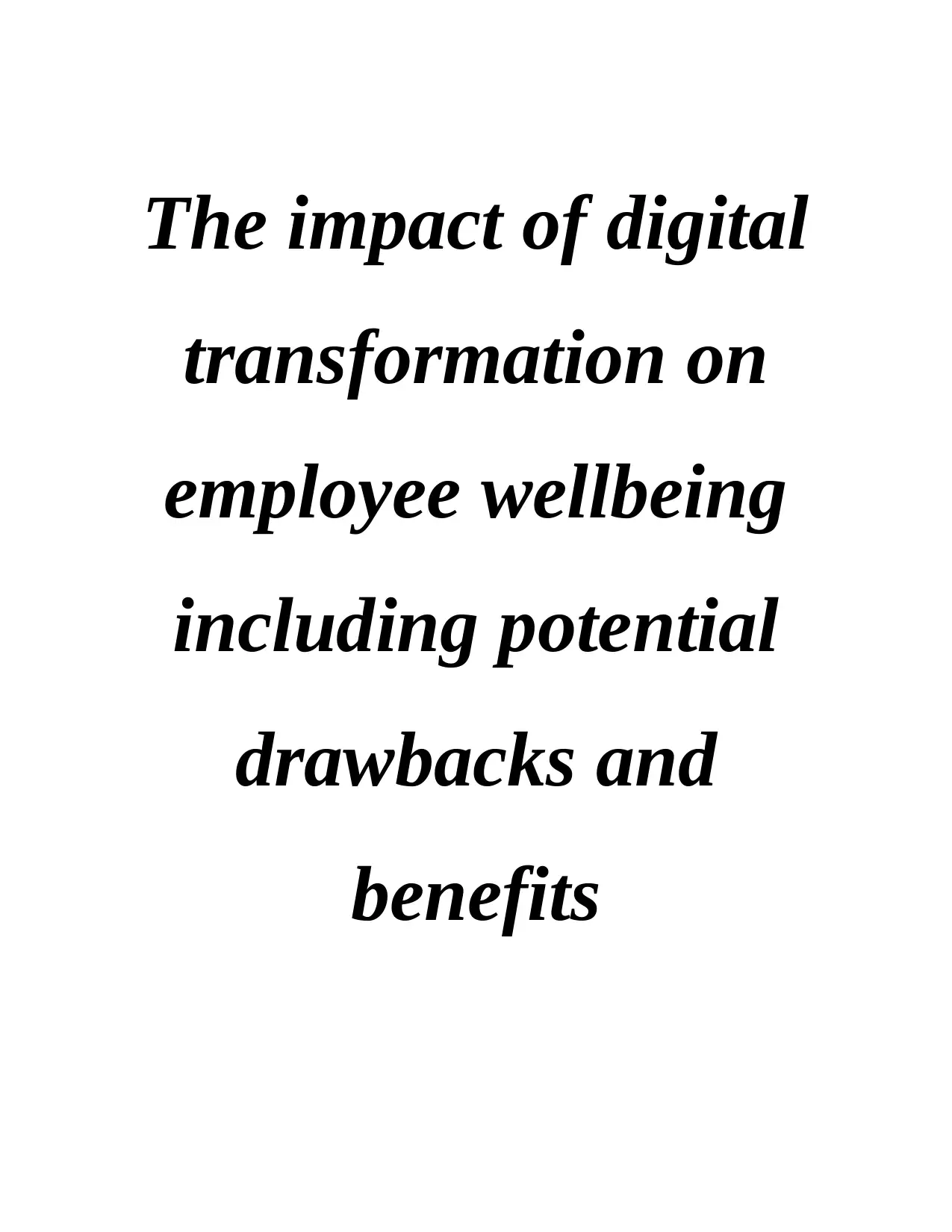
The impact of digital
transformation on
employee wellbeing
including potential
drawbacks and
benefits
transformation on
employee wellbeing
including potential
drawbacks and
benefits
Paraphrase This Document
Need a fresh take? Get an instant paraphrase of this document with our AI Paraphraser
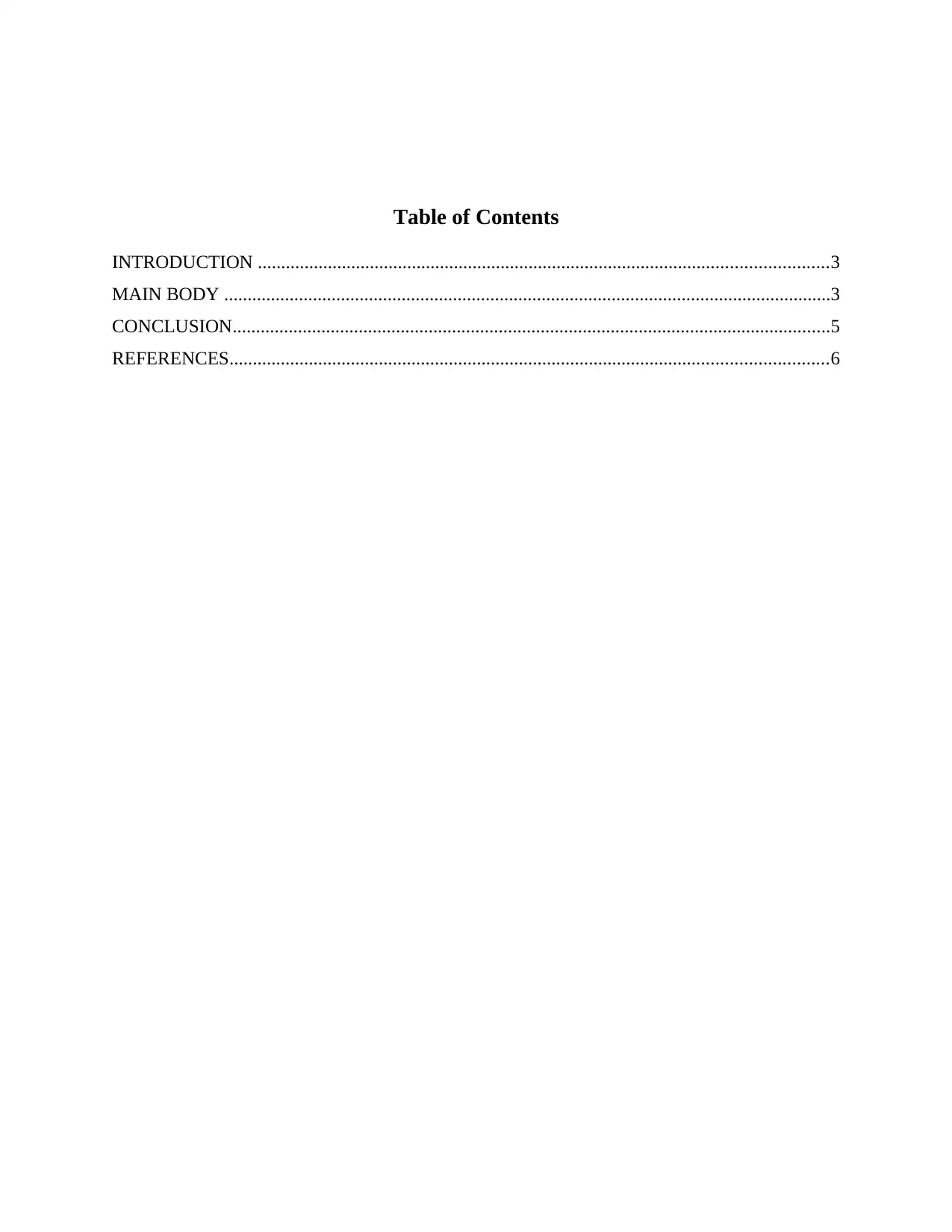
Table of Contents
INTRODUCTION ..........................................................................................................................3
MAIN BODY ..................................................................................................................................3
CONCLUSION................................................................................................................................5
REFERENCES................................................................................................................................6
INTRODUCTION ..........................................................................................................................3
MAIN BODY ..................................................................................................................................3
CONCLUSION................................................................................................................................5
REFERENCES................................................................................................................................6
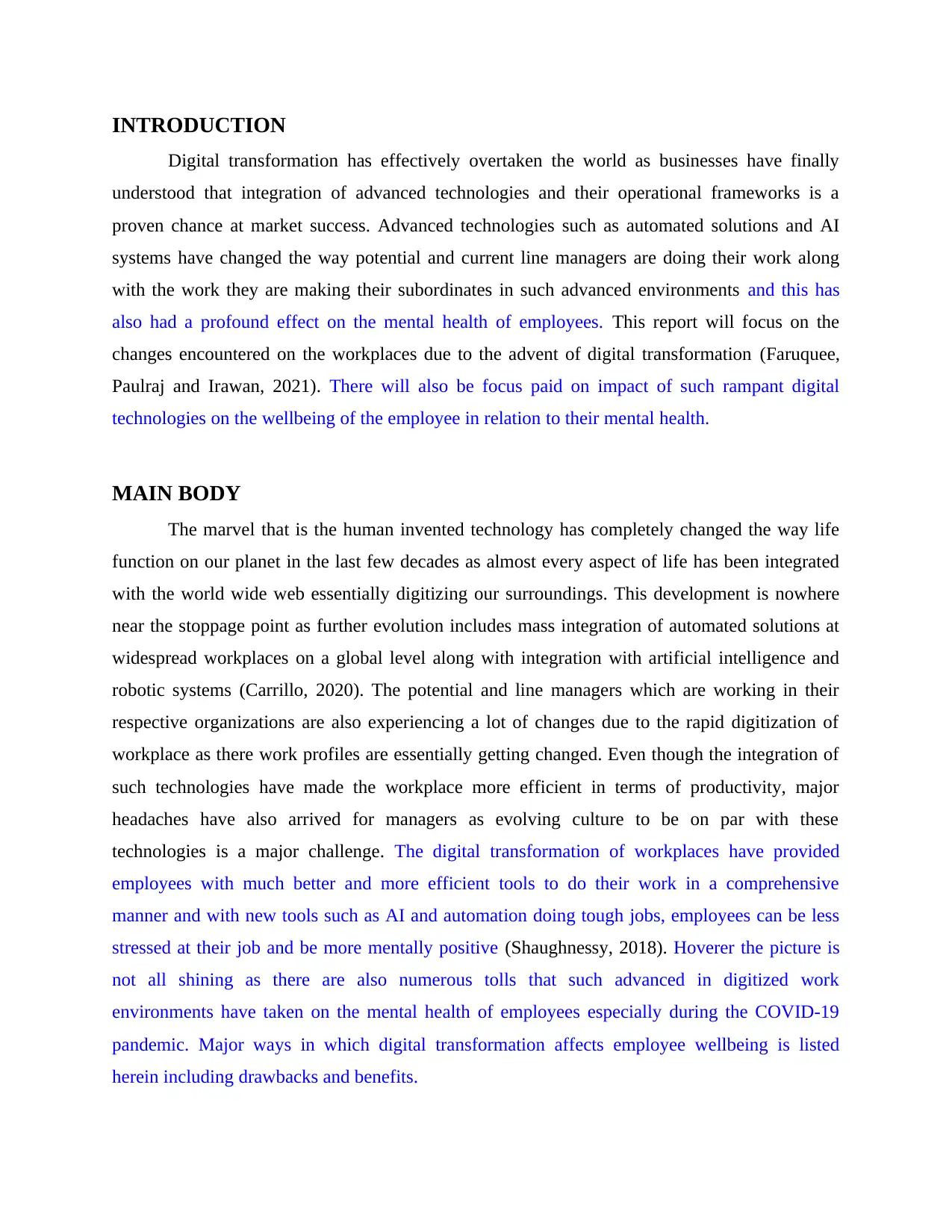
INTRODUCTION
Digital transformation has effectively overtaken the world as businesses have finally
understood that integration of advanced technologies and their operational frameworks is a
proven chance at market success. Advanced technologies such as automated solutions and AI
systems have changed the way potential and current line managers are doing their work along
with the work they are making their subordinates in such advanced environments and this has
also had a profound effect on the mental health of employees. This report will focus on the
changes encountered on the workplaces due to the advent of digital transformation (Faruquee,
Paulraj and Irawan, 2021). There will also be focus paid on impact of such rampant digital
technologies on the wellbeing of the employee in relation to their mental health.
MAIN BODY
The marvel that is the human invented technology has completely changed the way life
function on our planet in the last few decades as almost every aspect of life has been integrated
with the world wide web essentially digitizing our surroundings. This development is nowhere
near the stoppage point as further evolution includes mass integration of automated solutions at
widespread workplaces on a global level along with integration with artificial intelligence and
robotic systems (Carrillo, 2020). The potential and line managers which are working in their
respective organizations are also experiencing a lot of changes due to the rapid digitization of
workplace as there work profiles are essentially getting changed. Even though the integration of
such technologies have made the workplace more efficient in terms of productivity, major
headaches have also arrived for managers as evolving culture to be on par with these
technologies is a major challenge. The digital transformation of workplaces have provided
employees with much better and more efficient tools to do their work in a comprehensive
manner and with new tools such as AI and automation doing tough jobs, employees can be less
stressed at their job and be more mentally positive (Shaughnessy, 2018). Hoverer the picture is
not all shining as there are also numerous tolls that such advanced in digitized work
environments have taken on the mental health of employees especially during the COVID-19
pandemic. Major ways in which digital transformation affects employee wellbeing is listed
herein including drawbacks and benefits.
Digital transformation has effectively overtaken the world as businesses have finally
understood that integration of advanced technologies and their operational frameworks is a
proven chance at market success. Advanced technologies such as automated solutions and AI
systems have changed the way potential and current line managers are doing their work along
with the work they are making their subordinates in such advanced environments and this has
also had a profound effect on the mental health of employees. This report will focus on the
changes encountered on the workplaces due to the advent of digital transformation (Faruquee,
Paulraj and Irawan, 2021). There will also be focus paid on impact of such rampant digital
technologies on the wellbeing of the employee in relation to their mental health.
MAIN BODY
The marvel that is the human invented technology has completely changed the way life
function on our planet in the last few decades as almost every aspect of life has been integrated
with the world wide web essentially digitizing our surroundings. This development is nowhere
near the stoppage point as further evolution includes mass integration of automated solutions at
widespread workplaces on a global level along with integration with artificial intelligence and
robotic systems (Carrillo, 2020). The potential and line managers which are working in their
respective organizations are also experiencing a lot of changes due to the rapid digitization of
workplace as there work profiles are essentially getting changed. Even though the integration of
such technologies have made the workplace more efficient in terms of productivity, major
headaches have also arrived for managers as evolving culture to be on par with these
technologies is a major challenge. The digital transformation of workplaces have provided
employees with much better and more efficient tools to do their work in a comprehensive
manner and with new tools such as AI and automation doing tough jobs, employees can be less
stressed at their job and be more mentally positive (Shaughnessy, 2018). Hoverer the picture is
not all shining as there are also numerous tolls that such advanced in digitized work
environments have taken on the mental health of employees especially during the COVID-19
pandemic. Major ways in which digital transformation affects employee wellbeing is listed
herein including drawbacks and benefits.
⊘ This is a preview!⊘
Do you want full access?
Subscribe today to unlock all pages.

Trusted by 1+ million students worldwide
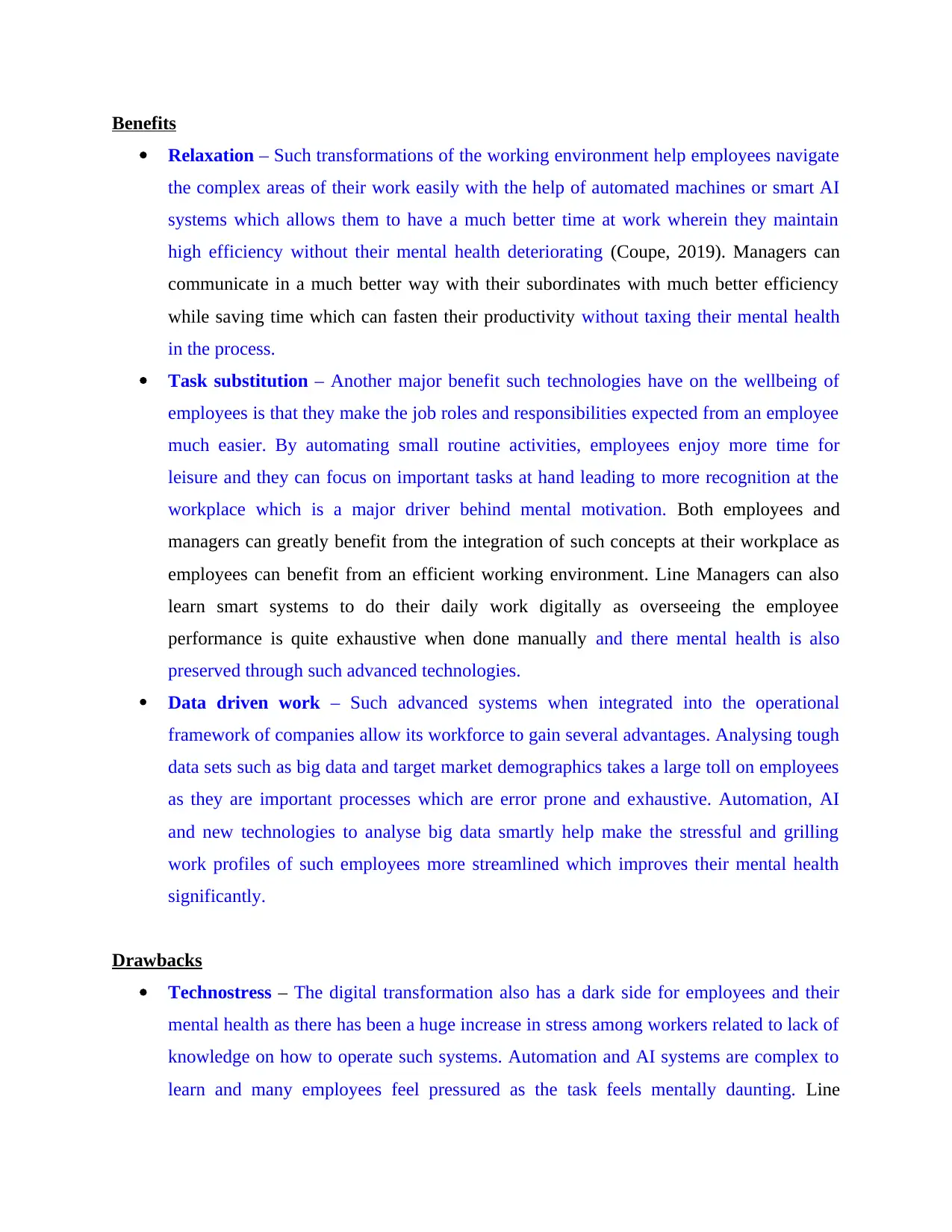
Benefits
Relaxation – Such transformations of the working environment help employees navigate
the complex areas of their work easily with the help of automated machines or smart AI
systems which allows them to have a much better time at work wherein they maintain
high efficiency without their mental health deteriorating (Coupe, 2019). Managers can
communicate in a much better way with their subordinates with much better efficiency
while saving time which can fasten their productivity without taxing their mental health
in the process.
Task substitution – Another major benefit such technologies have on the wellbeing of
employees is that they make the job roles and responsibilities expected from an employee
much easier. By automating small routine activities, employees enjoy more time for
leisure and they can focus on important tasks at hand leading to more recognition at the
workplace which is a major driver behind mental motivation. Both employees and
managers can greatly benefit from the integration of such concepts at their workplace as
employees can benefit from an efficient working environment. Line Managers can also
learn smart systems to do their daily work digitally as overseeing the employee
performance is quite exhaustive when done manually and there mental health is also
preserved through such advanced technologies.
Data driven work – Such advanced systems when integrated into the operational
framework of companies allow its workforce to gain several advantages. Analysing tough
data sets such as big data and target market demographics takes a large toll on employees
as they are important processes which are error prone and exhaustive. Automation, AI
and new technologies to analyse big data smartly help make the stressful and grilling
work profiles of such employees more streamlined which improves their mental health
significantly.
Drawbacks
Technostress – The digital transformation also has a dark side for employees and their
mental health as there has been a huge increase in stress among workers related to lack of
knowledge on how to operate such systems. Automation and AI systems are complex to
learn and many employees feel pressured as the task feels mentally daunting. Line
Relaxation – Such transformations of the working environment help employees navigate
the complex areas of their work easily with the help of automated machines or smart AI
systems which allows them to have a much better time at work wherein they maintain
high efficiency without their mental health deteriorating (Coupe, 2019). Managers can
communicate in a much better way with their subordinates with much better efficiency
while saving time which can fasten their productivity without taxing their mental health
in the process.
Task substitution – Another major benefit such technologies have on the wellbeing of
employees is that they make the job roles and responsibilities expected from an employee
much easier. By automating small routine activities, employees enjoy more time for
leisure and they can focus on important tasks at hand leading to more recognition at the
workplace which is a major driver behind mental motivation. Both employees and
managers can greatly benefit from the integration of such concepts at their workplace as
employees can benefit from an efficient working environment. Line Managers can also
learn smart systems to do their daily work digitally as overseeing the employee
performance is quite exhaustive when done manually and there mental health is also
preserved through such advanced technologies.
Data driven work – Such advanced systems when integrated into the operational
framework of companies allow its workforce to gain several advantages. Analysing tough
data sets such as big data and target market demographics takes a large toll on employees
as they are important processes which are error prone and exhaustive. Automation, AI
and new technologies to analyse big data smartly help make the stressful and grilling
work profiles of such employees more streamlined which improves their mental health
significantly.
Drawbacks
Technostress – The digital transformation also has a dark side for employees and their
mental health as there has been a huge increase in stress among workers related to lack of
knowledge on how to operate such systems. Automation and AI systems are complex to
learn and many employees feel pressured as the task feels mentally daunting. Line
Paraphrase This Document
Need a fresh take? Get an instant paraphrase of this document with our AI Paraphraser
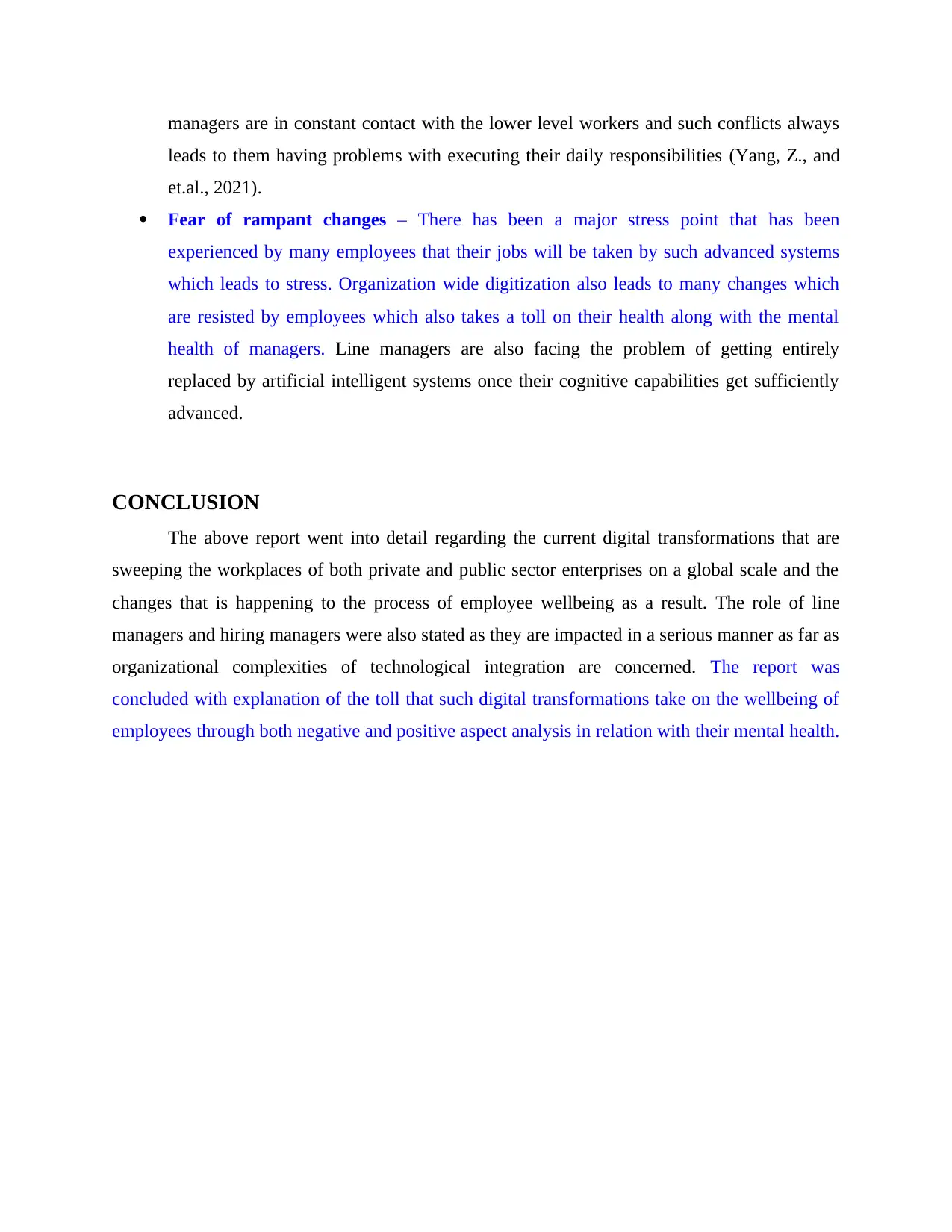
managers are in constant contact with the lower level workers and such conflicts always
leads to them having problems with executing their daily responsibilities (Yang, Z., and
et.al., 2021).
Fear of rampant changes – There has been a major stress point that has been
experienced by many employees that their jobs will be taken by such advanced systems
which leads to stress. Organization wide digitization also leads to many changes which
are resisted by employees which also takes a toll on their health along with the mental
health of managers. Line managers are also facing the problem of getting entirely
replaced by artificial intelligent systems once their cognitive capabilities get sufficiently
advanced.
CONCLUSION
The above report went into detail regarding the current digital transformations that are
sweeping the workplaces of both private and public sector enterprises on a global scale and the
changes that is happening to the process of employee wellbeing as a result. The role of line
managers and hiring managers were also stated as they are impacted in a serious manner as far as
organizational complexities of technological integration are concerned. The report was
concluded with explanation of the toll that such digital transformations take on the wellbeing of
employees through both negative and positive aspect analysis in relation with their mental health.
leads to them having problems with executing their daily responsibilities (Yang, Z., and
et.al., 2021).
Fear of rampant changes – There has been a major stress point that has been
experienced by many employees that their jobs will be taken by such advanced systems
which leads to stress. Organization wide digitization also leads to many changes which
are resisted by employees which also takes a toll on their health along with the mental
health of managers. Line managers are also facing the problem of getting entirely
replaced by artificial intelligent systems once their cognitive capabilities get sufficiently
advanced.
CONCLUSION
The above report went into detail regarding the current digital transformations that are
sweeping the workplaces of both private and public sector enterprises on a global scale and the
changes that is happening to the process of employee wellbeing as a result. The role of line
managers and hiring managers were also stated as they are impacted in a serious manner as far as
organizational complexities of technological integration are concerned. The report was
concluded with explanation of the toll that such digital transformations take on the wellbeing of
employees through both negative and positive aspect analysis in relation with their mental health.
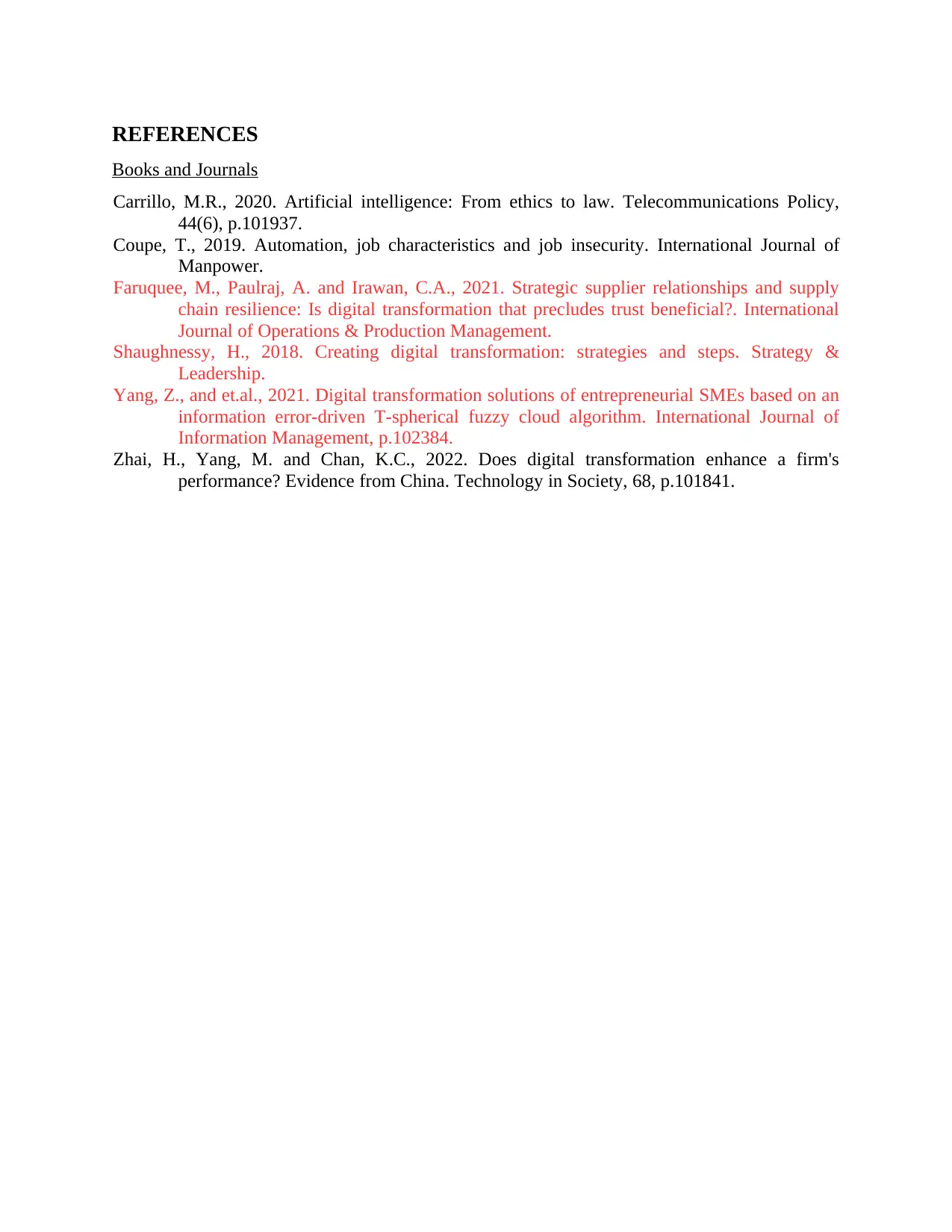
REFERENCES
Books and Journals
Carrillo, M.R., 2020. Artificial intelligence: From ethics to law. Telecommunications Policy,
44(6), p.101937.
Coupe, T., 2019. Automation, job characteristics and job insecurity. International Journal of
Manpower.
Faruquee, M., Paulraj, A. and Irawan, C.A., 2021. Strategic supplier relationships and supply
chain resilience: Is digital transformation that precludes trust beneficial?. International
Journal of Operations & Production Management.
Shaughnessy, H., 2018. Creating digital transformation: strategies and steps. Strategy &
Leadership.
Yang, Z., and et.al., 2021. Digital transformation solutions of entrepreneurial SMEs based on an
information error-driven T-spherical fuzzy cloud algorithm. International Journal of
Information Management, p.102384.
Zhai, H., Yang, M. and Chan, K.C., 2022. Does digital transformation enhance a firm's
performance? Evidence from China. Technology in Society, 68, p.101841.
Books and Journals
Carrillo, M.R., 2020. Artificial intelligence: From ethics to law. Telecommunications Policy,
44(6), p.101937.
Coupe, T., 2019. Automation, job characteristics and job insecurity. International Journal of
Manpower.
Faruquee, M., Paulraj, A. and Irawan, C.A., 2021. Strategic supplier relationships and supply
chain resilience: Is digital transformation that precludes trust beneficial?. International
Journal of Operations & Production Management.
Shaughnessy, H., 2018. Creating digital transformation: strategies and steps. Strategy &
Leadership.
Yang, Z., and et.al., 2021. Digital transformation solutions of entrepreneurial SMEs based on an
information error-driven T-spherical fuzzy cloud algorithm. International Journal of
Information Management, p.102384.
Zhai, H., Yang, M. and Chan, K.C., 2022. Does digital transformation enhance a firm's
performance? Evidence from China. Technology in Society, 68, p.101841.
⊘ This is a preview!⊘
Do you want full access?
Subscribe today to unlock all pages.

Trusted by 1+ million students worldwide
1 out of 6
Related Documents
Your All-in-One AI-Powered Toolkit for Academic Success.
+13062052269
info@desklib.com
Available 24*7 on WhatsApp / Email
![[object Object]](/_next/static/media/star-bottom.7253800d.svg)
Unlock your academic potential
Copyright © 2020–2025 A2Z Services. All Rights Reserved. Developed and managed by ZUCOL.




